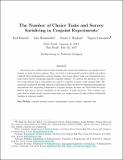The Number of Choice Tasks and Survey Satisficing in Conjoint Experiments
Author(s)
Bansak, Kirk; Hainmueller, Jens; Hopkins, Daniel J.; Yamamoto, Teppei
DownloadSSRN-id2916951.pdf (259.9Kb)
OPEN_ACCESS_POLICY
Open Access Policy
Creative Commons Attribution-Noncommercial-Share Alike
Terms of use
Metadata
Show full item recordAbstract
In recent years, political and social scientists have made increasing use of conjoint survey designs to study decision-making. Here, we study a consequential question which researchers confront when implementing conjoint designs: How many choice tasks can respondents perform before survey satisficing degrades response quality? To answer the question, we run a set of experiments where respondents are asked to complete as many as 30 conjoint tasks. Experiments conducted through Amazon's Mechanical Turk and Survey Sampling International demonstrate the surprising robustness of conjoint designs, as there are detectable but quite limited increases in survey satisficing as the number of tasks increases. Our evidence suggests that in similar study contexts researchers can assign dozens of tasks without substantial declines in response quality. Key Words: conjoint analysis, survey experiments, survey fatigue, response bias
Date issued
2018-01Department
Massachusetts Institute of Technology. Department of Political ScienceJournal
Political Analysis
Publisher
Cambridge University Press (CUP)
Citation
Bansak, Kirk, et al. “The Number of Choice Tasks and Survey Satisficing in Conjoint Experiments.” Political Analysis, vol. 26, no. 01, Jan. 2018, pp. 112–19. © 2018 The Authors
Version: Author's final manuscript
ISSN
1047-1987
1476-4989